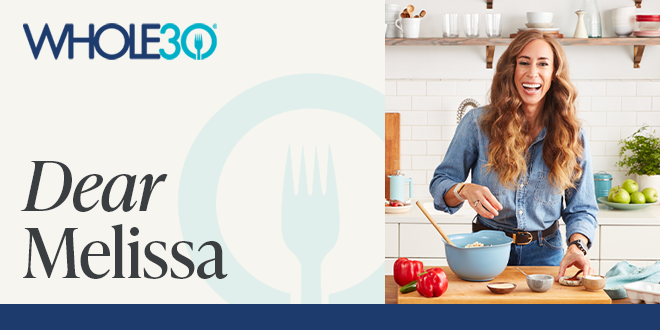Dear Melissa,
I have toyed with doing the Whole30 for years, and I’m getting closer. But I still wonder, how much preparation is too much? I think I need to spend time breaking a few bad habits before I jump in. I’ve kicked alcohol (that was a big reason I put off starting). Now I feel like I need to get a few other situations right first. Specifically, I’m worried failure will come at the hands of coffee and my nightly diet ginger ale. Should I put my Whole30 off until I get those two more things handled? —Waiting to start
Hi Waiting!
You asked, “How much preparation is too much.” The answer to that is always, “it depends.” Should you put off starting until your house is more in order? Should you jump in and tackle all of these habits at the same time? Let’s discuss the pros and cons of starting now versus preparing more.
The benefits of preparing more
Planning and preparing are the key to Whole30 success. The Whole30 elimination phase represents a big change for most people. Starting before you’re properly prepared is a recipe for giving up early—what you called “failing.”
Planning and preparing, however, can take many forms. At minimum, I’d want you to plan some meals, go grocery shopping, prep some food, and recruit your Whole30 support team. For some, it may mean adding a soft launch approach, working on one or more specific, often emotionally-attached, habits (like reducing sugar or quitting alcohol) before you start.
It may feel easier to “baby step” your way into the Whole30 Program Rules by addressing your nightly wine habit, diet soda habit, and coffee habit (with cream and sugar, I assume). If your attachments to these habits are strong and longstanding, it may feel scary enough just giving those things up. If taking a few months to quit alcohol felt critical for your Whole30 success, then delaying your start was a smart choice. You may also feel more confident heading into the program if you first spend time reducing your reliance on ginger ale and/or coffee.
Summary: Working to address one food (or drink) habit at a time is less uncomfortable, feels more attainable, and could set you up for an easier transition into the full Whole30.
The cons of preparing more
On the other hand, there will always be something to “get in order” before you start the Whole30. And wanting to get everything in line first could mean you never start at all.
I’m not saying your strategy is a procrastination technique, but you can see how it could easily turn into that. You work on your ginger ale habit for a month, then decide your “eating chips and ice cream after dinner” might also be tough to overcome. So you work on that for a month or two, and then realize you eat some form of bread with most meals… Before you know it, six months have passed, and you still haven’t started the Whole30.
Not only are you less likely to start the program if you continue to baby-step (nitpick?) your preparation, but you’re also more likely to backslide on one of your other habits. Focusing all your willpower on chips may mean your chocolate cravings increase. Quitting sugar and cream in your coffee may make you more likely to reach for a pastry in the break room. Without the commitment of the Whole30 (a clearly defined set of guidelines with built-in accountability), you’re relying on willpower, self-control, and internal expectations. Bouncing your attention from one habit to the next over a long period of time can allow other habits to creep in due to stress or inattention.
Summary: There is no way to feel 100% prepared for the Whole30. At some point, you just have to commit, and get through the short-term discomfort for the long-term benefits.
The Whole30 vs. quick-fix, weight-loss diets
I understand why you’re afraid to “fail” the Whole30. The quick-fix weight-loss diets you’ve likely done in the past have set you up to fail. It’s not your fault—it’s the nature of these kinds of diets. But they make it seem like you weren’t committed, motivated, or prepared enough—and that feeling can be hard to shake.
Remember, though, the Whole30 is different! We don’t count or restrict calories, portions, or meals, so you won’t be battling constant hunger. You’ll learn to listen to your body, and trust the signals it’s sending you. And we have so much support, provide so many resources, and offer many levels of accountability along the way.
So here’s what’s going to happen: You’ll drink your coffee black (or with nutpods), and you may not love it at first, but you’ll make it work. You’ll miss your ginger ale, but you’ll start buying LaCroix or Humm Kombucha or any of the Whole30 Approved® fizzy beverages, and learn to enjoy it. The first few days may feel hard, but you’ll quickly see positive changes (non-scale victories), which will motivate you to continue. And I predict by Day 15, you’ll be kicking yourself for not starting the Whole30 sooner.
I know you can do this. You’ve already succeeded with something huge—giving up alcohol! Let that momentum and sense of accomplishment carry you through. The Whole30 can be a truly life-changing experience. Say yes, make a plan, stick to it, and see how powerful you really are.
Wishing you huge Whole30 success!
Melissa














